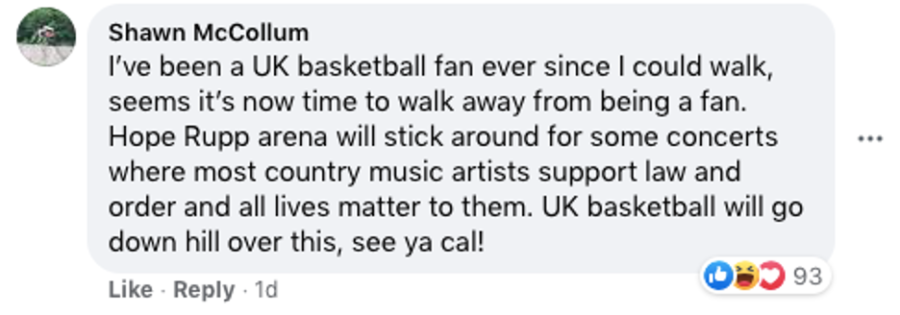More than athletes: Why UK fans should support the men’s basketball’s stand with BLM
September 4, 2020
Coach John Calipari and the UK men’s basketball team have decided that their time and influence won’t stop when they get off the court.
Last month, an image circulated on social media featuring Coach Cal having a conversation with his young athletes sitting around a table, addressing the importance of exercising their right and civic duty by voting.
In conjunction, a couple weeks later, UK MBB posted a video on Twitter and Facebook that included players wearing “Black Lives Matter” T-shirts, proclaiming their stance on the country’s political and social climate. The players speak about police brutality and systemic racism, while acknowledging the victims who have fallen prey to the country’s state-sanctioned institutions. The video also includes a call to action for the fans to step up and support the team off the court, with a few players stating their individual experiences of racism. The video ends with a clip of the team proclaiming, “Black Lives Matter,” while the historical, iconic, and dark song “Strange Fruit” by Billie Holiday plays over a black screen for the last 30 seconds.
As expected, the video was met with immediate polarization.
I won’t sugarcoat it; a large number of people (white, and largely old) took to Twitter replies and Facebook comments to express their disgust over the team’s show of unity with the Black Lives Matter movement by the team. Many claimed they would no longer be cheering for the team despite having watched them play for years. The “All Lives Matter” choir sang like canaries. Numerous people expressed disdain for mixing “politics” with sports.
However, the team has not wavered on their stance, so the folks hoping for a redaction shouldn’t hold their breath.
On the contrary, the thousands of retweets, likes and shares tell a story of imperative support. This video is important because it speaks to a huge point: racism is blind to everything besides skin color. It doesn’t discriminate between positions of power, income, or industry. These young athletes still wear their black skin when they move on and off the court, the same way an NBA player, no matter how successful, is still first and foremost a black man. The university doesn’t protect them. Money doesn’t protect them. Status doesn’t protect them.
Can one simply remove their blackness when they’re playing a game? Maybe some fans would like players to do so, but that’s not an option for the black athletes whose worth some fans are equating to entertainment. Making a choice not to watch or support the team doesn’t change their status as one, the same way playing a sport doesn’t change how they look. It isn’t “politics,” it’s their identity. It would be an unprecedented luxury if the challenges that accompanied their black experience were erased just because they’re athletes.
Many have argued that the reason they don’t support the video is because of the “Marxist” ties of the BLM movement, and that the team wouldn’t be supporting BLM if they knew about said “ties.” A simple Google search shows that two co-founders of the BLM organization are self-proclaimed Marxists. Marxism relates to capitalism and the hope of an eventual equivalence between the wealthy and the poor, not the anti-racist message with which protestors are identifying. Failing to separate the organization and the movement as two different entities has proven to be widely destructive to the cause. Once realized, it doesn’t make sense to draw parallels between Marxism and the BLM movement. Few BLM supporters would call themselves Marxists, just like few conservatives would call themselves three-percenters.
The culprit of the anger and division here is privilege. It’s privilege that allows people to stop supporting a team simply because the players want to stand up for lives being lost carelessly. Privilege allows them to discredit the hundreds of thousands of people peacefully protesting because of the few looting or rioting. It’s privilege that allows someone to justify a death because somehow, they know that it could’ve been avoided if someone complied.
I’m not naïve enough to believe these points will suddenly make the people under these posts stop arguing against a cause in which they’re needed, and neither is the team in the video. There is a fundamental disconnect between what the two opposing viewpoints believe is right and wrong. Unfortunately, I think it takes something really significant to change those beliefs. Nevertheless, it’s in their faces. It removes the comfort and blindness that many people would like to continue enjoying when they do things like watching sports. Black people don’t have that comfort or blindness. Why should you?
































































































































































